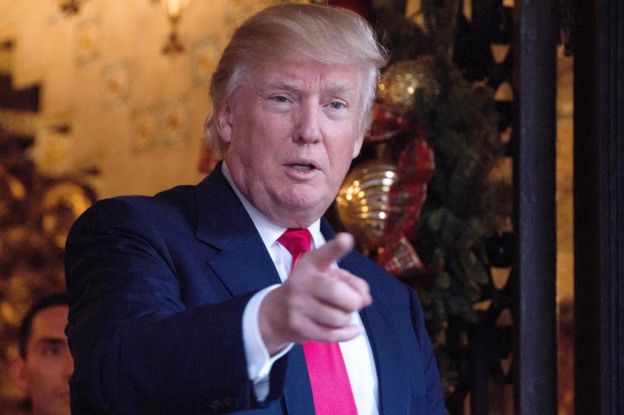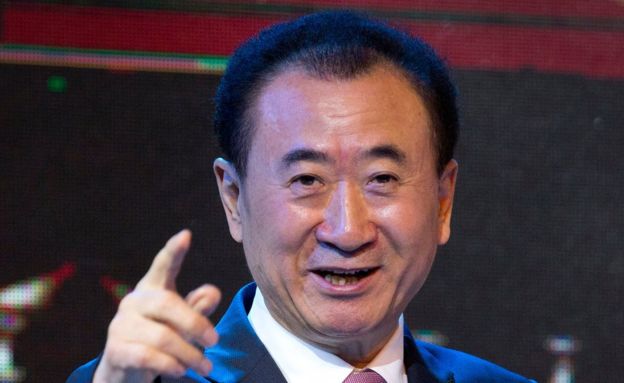Chinese netizens are known for coming up with quirky and creative terms for people and things making the news... and they spread like wildfire.
众所周知,中国网民擅长提出诡异又有创意的词语来形容新闻事件中的人和事……而且这些词语就像野火一般迅速蔓延开来。
From "skinny blue mushrooms" to "melon-eating masses", the BBC takes a look at what has captured their imaginations this year.
从“蓝瘦香菇”到“吃瓜群众”,BBC盘点了一下今年激发中国网民想象力的人和事。

'Sichuan Trump'
“川普”
US President-elect Donald Trump is known as "chuanpu" by mainstream media outlets.
美国总统当选人唐纳德·特朗普被主流媒体称为“川普”。
But the weirdest riff of all happened when some speculated that he was actually from the southwest province best known for its pandas and spicy food.
但最不可思议的段子就是有人猜测川普实际上来自中国西南地区的一个省,那儿因熊猫和辛辣食物而闻名。
The conspiracy theory, spread on social networks Weibo and WeChat, is that Trump was born in 1946 in Sichuan when his father set up a business in China.
“川普于1946年出生于四川,当时他的父亲在中国做生意”该阴谋论迅速在社交媒体微博和微信上传播开来。
It's nonsense of course, but that hasn't stopped some locals from claiming him as "the pride of Sichuan" - despite his recent verbal attacks against China.
当然这都是胡说八道的,然而虽然川普最近发表过攻击中国的言论,但这也阻止不了部分当地人称川普为“四川的骄傲”。

'Prehistoric powers'
“洪荒之力”
National swimmer Fu Yuanhui not only won a bronze medal at the Rio Olympic Games, but also scored a win with viewers in China in a now-iconic TV interview.
国家游泳运动员傅园慧不仅在里约奥运会上赢得了一枚铜牌,而且也在一次标志性电视采访中赢得了中国观众的好感。
When told she had qualified for the final, Fu pulled a comically exaggerated face and declared: "I have used all my prehistoric powers to swim!"
当被告知她赢得决赛资格的时候,傅园慧露出滑稽又夸张的表情说:“我已经用了洪荒之力了!”
'Prehistoric powers', or "honghuangzhili", was swiftly adopted as a term for an unstoppable force, while Fu became an internet darling.
很快,“洪荒之力”就被用来形容一种不可阻挡的力量,而傅园慧也因此成为了网红。
'Meteorological disaster'
“天灾”
As several Chinese cities choke in the annual winter smog, the Beijing authorities have come up with one novel way to address the problem.
随着多个中国城市陷入一年一度的冬季雾霾中,北京当局提出用一种新的方式来处理这个问题。
Earlier this month, municipal lawmakers said they were considering classifying smog as a meteorological disaster or "tianzai", arguing that the smog was caused not only by pollution but also weather conditions.
本月早些时候,市政立法议员表示,他们在考虑把雾霾归类为“天灾”,并主张雾霾不仅仅是由污染引起的,天气状况也是引起雾霾的一个原因。
The move drew mockery online from fed-up citizens with even state media publishing rare criticism. People's Daily quoted one professor saying that the plan "not only goes against science, it will also create an excuse for polluters to escape their culpability."
这项举动引来不满网民们的嘲弄,甚至官方媒体都发表了罕见的指责。人民日报引用了一位专家对此的评论,这项规划“不仅与科学相悖,而且还为污染环境者提供了一个逃避罪责的借口。”
'Skinny blue mushroom'
“蓝瘦香菇”
One man's misfortune in love turned out to be a goldmine for netizens, when a man from Guangxi province uploaded a video of himself talking about his loneliness while his girlfriend was away.
广西一名男子在女朋友离开后上传了一个自述孤独的视频,然而这名男子不幸的爱情成为网民们的笑谈。
“Unbearable, I want to cry," he moaned - but thanks to his heavy accent, it ended up sounding more like "skinny blue mushroom".
“难受,想哭,”他抱怨道,然而因为他浓重的口音,结果听起来就像“蓝瘦香菇”。
"Lanshouxianggu" was swiftly shared more widely and took off as a meme, mostly as a way to mock the southern Guangxi accent.
很快,“蓝瘦香菇”的表情包就在网上扩散开来,而且大多都在调侃广西南部的口音。
'Melon-eating masses'
“吃瓜群众”
The fullest expression of this term is "the melon-eating masses who don't know what's really going on".
这个词语的完整版为“不明真相的吃瓜群众”。
Its origin is unclear, but netizens often use this - sometimes derogatorily - to describe a passive group of bystanders at a major incident or event.
这个词语的出处未知,但网民们经常使用这个词语,有时候是带有贬义地比喻被动围观重大事件的旁观者。

'Setting a small target'
“设定一个小目标”
China's wealthiest man, Wang Jianlin, was met with the hollow laughter of cynical netizens earlier this year when he dished out advice on how to get rich.
今年早些时候,中国首富王健林给出了如何致富的建议,而愤世嫉俗的网民们则以虚伪的笑声作为回应。
"First set yourself a small target, for example, I first targeted to earn 100 million yuan!" he said in a television interview in August.
在八月的一次电视采访中,他说道,“首先你要设定一个小目标,比如,我先赚上一个亿!”
What followed was an avalanche of sarcasm online as people pointed out the impossibility of earning the equivalent of $14.3m in their entire lifetimes, let alone as a first step. The term has since been used sarcastically to refer to an impossible goal.
他的建议引来了网络上的大量讽刺,人们指出自己一生都不可能赚一个亿(相当于1430万美元),更不用说作为第一个目标。自那以后,这个词语就被用来讽刺一个不可能实现的目标。







